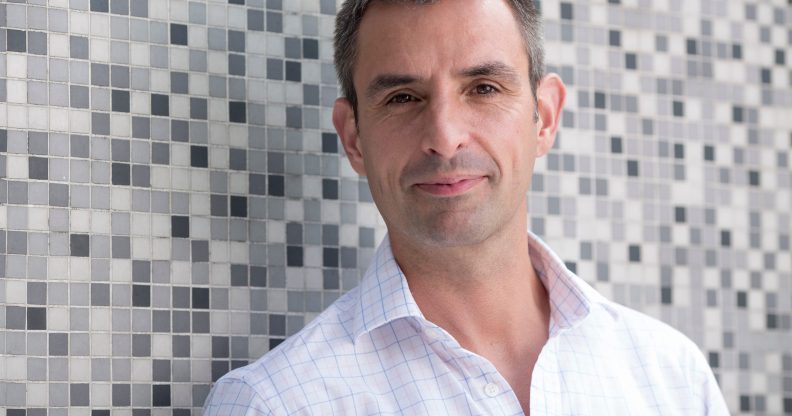This is why it’s vital for businesses to empower their LGBT+ employees as the COVID-19 health crisis takes hold

MHFA CEO Simon Blake. (Jason Alden)
Simon Blake, CEO of Mental Health First Aid (MHFA) England is a member of the LGBT+ community and, as such, knows how complex it can be for a queer person to manage their mental health in the workplace.
As part of My Whole Self, MHFA England’s new campaign for workplace culture change, he writes for PinkNews to explain why organisations must do more to empower their LGBT+ employees to bring their whole self to work.
We all need an inclusive environment in order to thrive, but for many LGBT+ people, there are still barriers to discussing and living out their full identity in the workplace.
I know from my own experience that it is not easy to come out at work. When I first stepped onto the career ladder as a gay man in the 1990s, I was nervous about discussing my sexuality with my colleagues.
Although I had come out to friends and family, I was worried about what those in my workplace would think. Despite being in a more privileged position than many due to working in the sexual health sector, I still didn’t feel that I could be my whole self at that time.
Fortunately, my managers were very understanding and supportive – I was lucky. Looking back, once I felt able to discuss my sexuality at work, the relationships with my colleagues improved, as did my job performance.
I could talk openly about my relationships and other aspects of my personal life, which allowed me to place a focus on my career.
But this isn’t everyone’s experience. Sadly, many LGBT+ employees still feel they must hide parts of their identity. Stonewall has found more than a third of LGBT+ staff (35 per cent) have not come out at work.
In 2010 the Equality Act became law – it protects people from discrimination, harassment, and victimisation, because of protected characteristics we have.
But beyond the legal duty, employers need to do much more to celebrate and support people of all different backgrounds, cultures, beliefs for the benefit both of their staff and, ultimately, of their business.
In 2020, we shouldn’t have to leave parts of our identity – be that our sexuality, gender identity, mental health, or cultural background – at the door when we start work.
People should not have to fear judgement, bullying, discrimination or harm – everyone should have the safety and freedom to be their whole self.
If we feel we have to hide parts of ourselves when working, our minds become focused on protection rather than excellence and innovation. Through being our whole self when working, we are liberated to focus on our performance.
When we have a sense of belonging, we are empowered to develop stronger connections with our colleagues, to unlock our creativity, and to manage more effectively.
Google’s landmark study, Project Aristotle, found that psychological safety is one of the five key elements of every successful team. Diversity in a workforce is a strength but it must be matched by an actively inclusive environment to leverage the benefits of psychologically safe working.
We need that contract of trust and understanding at a basic level in order for us to effectively connect with our colleagues and perform at our best.
Whether online or offline, bringing your whole self to work is a mindset that is better for wellbeing and better for business. And we are grateful to have the support of leaders from organisations including Bupa, Twitter UK, LinkedIn, and the CBI, as well as leading LGBT+ campaigners, including competitive swimmer Michael Gunning and Stonewall Trustee Jan Gooding.
When we’re empowered to be our ‘whole self’ at work we can build deeper connections and teams that feel safe and connected work better together. But to do this they need a working environment that allows them to be authentic and show their whole self.
That’s why Mental Health First Aid (MHFA) England has created My Whole Self, as a campaign for workplace culture change My Whole Self calling on organisations to empower employees to be their whole self at work.
The first My Whole Self Day will see workplaces across the country encourage people to build deeper connections with colleagues at a time when millions of people move towards remote working.
As the current health crisis sees more people working from home than ever before, we will be focusing our activities on providing guidance designed to support employees feeling the impact of the coronavirus.
Human connections are so important at this time. Nurturing them virtually will be key to supporting the nation’s mental health and wellbeing as we come together to tackle the impact of coronavirus.
So, join us as we encourage everyone to build deeper connections with colleagues. Take part online by sharing your whole self with a My Whole Selfie.
We want everyone – whoever they are and wherever they’re working from – to feel they can bring their whole self to their work, both on My Whole Self Day and every day of the year.
Find out more about MHFA England’s campaign My Whole Self and how to get involved at mhfaengland.org/my-whole-self.

